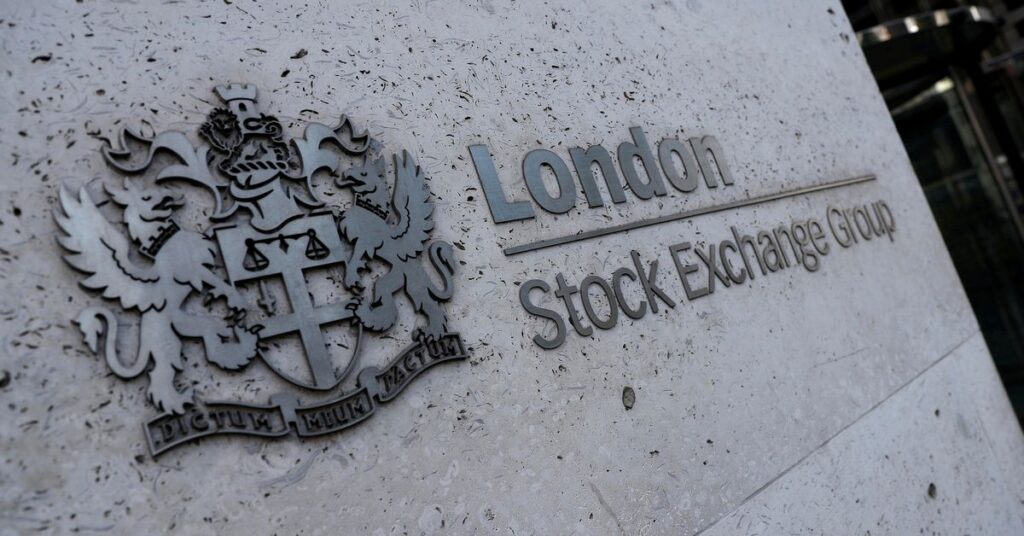[1/2]Signage is seen outside the entrance of the London Stock Exchange in London, Britain. Aug 23, 2018. REUTERS/Peter Nicholls/File Photo
LONDON, July 10 (Reuters) – U.S. stocks were poised to open lower on Monday as investors took to the sidelines ahead of a inflation report and following Chinese data that heightened worries of an economic slowdown.
Trading volumes on both the S&P and Nasdaq futures indices dropped to their lowest so far this month and prices corresponded by dipping by 0.2% and 0.3% respectively. The pan-European STOXX 600 index (.STOXX) rose 0.1% by 1050 GMT.
Chinese consumer price figures fell in June, making them almost unchanged from a year earlier, while producer prices slid deeper into negative territory.
The weakness implies scope for further monetary policy easing, but also underlines the challenge Beijing faces in reflating its economy and avoiding a deflationary spiral.
“China is just a symptom. We see weaker growth around the world because of the effect of higher interest rates. China is exposed to that because of their export sensitivity,” said Matthias Scheiber, global head of multi-asset portfolio management at Allspring Global Investments.
“The challenge going forward, will be on equity valuations. If there is no improvement in earnings it will be hard for equities to continue to rally,” added Scheiber.
The earnings season starts this week with JPMorgan (JPM.N), Citigroup (C.N), Wells Fargo (WFC.N), State Street (STT.N) and PepsiCo (PEP.O) among those reporting.
CPI SLOWDOWN
U.S. consumer prices are expected on Wednesday to show headline inflation slowed to its lowest since early 2021 at 3.1%, down from 9.1% a year earlier.
“We have been optimistic about the soft landing story since April. The consumer seems to be stronger than anyone imagined. There’s still lots of money in people’s accounts and at the same time, people are highly employed,” said Fahad Kamal, chief investment officer at SG Kleinwort Hambros.
“Barring any upside surprise, U.S. inflation should ease from here and the Fed might be near done,” added Kamal.
Markets still think the Federal Reserve is likely to hike rates this month, but a weak CPI might lessen the risk of a further move in September.
Currently futures imply around a 90% probability of a rise to 5.25%-5.5% this month, and a 24% chance of a move in September.
Fed officials have been mostly hawkish in their communications, while markets have also priced in higher rates in Europe and the UK. Canada’s central bank meets this week and markets imply a 67% chance of another hike.
The risk of higher global rates for longer has caused havoc in bond markets, where U.S. 10-year yields jumped 23 basis points last week, German yields 24 basis points and UK yields 26 basis points.
On Monday, U.S. two-year yields last stood at 4.92%, having hit a 16-year high of 5.12% last week.
The jump in developed-world yields caused ripples in currency markets, particularly in carry trades where investors borrow yen at super-low rates to invest in high-yielding emerging market currencies.
The net result was a rush to close yen short positions which saw the Japanese currency rally across the board last week, though it struggled to sustain this on Monday.
The dollar edged back up to 142.46 yen , after sliding 1.3% on Friday. The euro , down 0.1%, and pound down 0.4% took knocks against a stronger dollar.
In commodity markets, gold steadied at $1,923 an ounce after making a slight gain last week.
Oil prices eased slightly, having touched nine-week highs last week as top exporters Saudi Arabia and Russia announced new output cuts.
Brent and U.S. crude both fell respectively about 0.7% to $77.95 and $73.30 a barrel.
Reporting by Nell Mackenzie; Editing by Amanda Cooper, Stephen Coates, Ed Osmond and Barbara Lewis
: .


